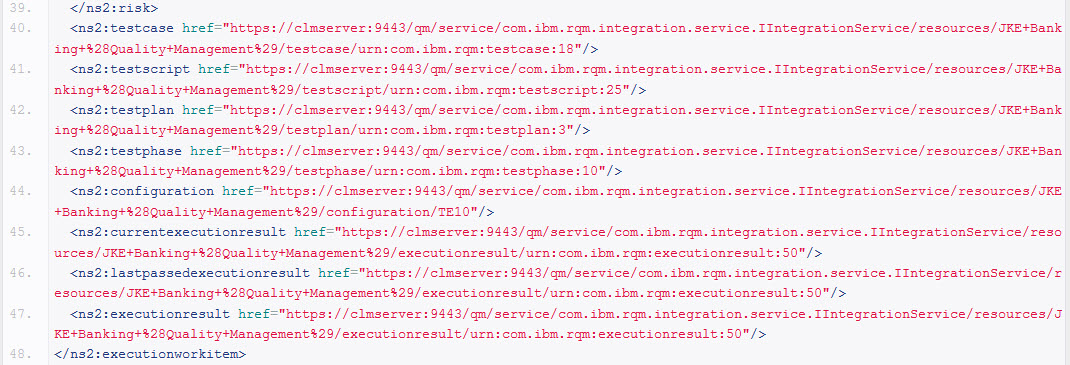Creating Multiple Test Case Execution Records with REST API for a single Test Case
4 answers
I guess you would need to iterate in your client app.
But since you mention a crash, I'd advise you to reproduce with an attempt to create the smallest amount of TCERs.
Ideally, you would want to reduce this number to 1 only.
From there, you could debug / check whether your POST/PUT URL, headers and the Test Phase, Test Env, Test Plan that you feed your new TCERs are really valid. In case of incorrect configuration, the RQM would normally provide you some useful message.
References:
- the core one is RQM Reportable REST API: https://jazz.net/wiki/bin/view/Main/RqmApi
- for examples of URLs, you could refer to the following blog post: http://sleroyblog.wordpress.com/2013/04/09/querying-rqm-40-through-oslc-and-rest-api/
Regards,
Stéphane
Comments
Hi Matt,
I believe your suspicion is right. A TCER is defined by a limited number of characteristics (test plan, test phase, test environment...). The RQM tool would not let you create TCERs that are considered redundant with a pre-existing one.
What's your use case for varying the category of a full defined (i.e. with test plan, etc.) Test Case Execution Record ?
Regards,
Stéphane
Comments
In this use case, there exists one test plan.
Hi Matthew,
first, let me share with you that I don't have a definitive answer for your particular use case.
That being said:
- I got that you're NOT using RQM for planning your test execution effort (through preliminary creation of TCERs) but only for reporting.
- but AFAIK, this doesn't imply that you would need some "duplicated" TCERs (i.e. TCER with exact same test env, test phase, etc.) in RQM.
Instead, I wonder if you have checked the option of having your internal tool to directly/indirectly feed RQM with the missing TCERs "on-the-fly" ? By "on-the-fly", I think of a process triggered in a periodic basis that would update RQM with NEW TCERs. Note that it should run BEFORE any related test execution result(s) is/are reported in RQM,
That way, you would not reach a situation where a test result is to be reported in RQM but was left orphan (in terms of associated TCER) like in your current situation.
My 2 cts.
- Stéphane
Hey Stephane,
To be clear, try to PUT two TCERs into a single test case with whichever configurations you want over the RQM Reportable REST API. I have observed the second TCER to be rejected since RQM views it as a redundant artifact (again, since one cannot specify test environment and iteration during the PUT). Perhaps I have overlook something?
If you PUT the exact same TCERs definition: yes, indeed it will be rejected (nominal behavior). But if you change whatever part of n-uple (test Plan, test phase, test environment, etc.) so that's it's new to RQM, it should pass.
If you should re-use the same n-uple / TCER, then do not try to create it again, just reference the existing one when adding a new test result.
Maybe it's me who misunderstand your need ?...
Comments
Hi Matthew,
hummh... anything wrong with your REST calls ?
A GET request on a TCER does provide Test Environment & Test Phase information. Let me provide what I get on a 5.0 (would be similar in 4.x):

You should be able to POST/PUT new combinations of n-uples / TCERs
Regards,
Stéphane
1 vote
Thanks Stephane. I was not aware that iteration is configurable by "Test Phase". Can you point me to where this is documented in Jazz for the RqmAPi?
Thanks Stephane. I was not aware that iteration is configurable by "Test Phase". Can you point me to where this is documented in Jazz for the RqmAPi?
Matthew, for clarifications on Test Phases and Iterations, I suggest you check the references provided by Don in this previous question:
https://jazz.net/forum/questions/164734/rqm-rest-api-testphases-vs-iterations